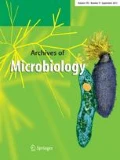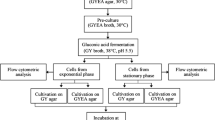Abstract
Late-exponential-phase cells of Escherichia coli O157:H- strain E32511/HSC became nonculturable in sterilized distilled water microcosms at 4 °C. Plate counts declined from 3 × 106 to less than 0.1 CFU/ml in about 21 days. However, when samples of microcosms at 21 days were inoculated onto an agar medium amended with catalase or nonenzyme peroxide-degrading compounds such as sodium pyruvate or α-ketoglutaric acid, plate counts increased to 104–105 CFU/ml within 48 h. The proposed mode of action of the catalase or pyruvate is via the degradation of the metabolic by-product H2O2, rather than through supplementation of a required nutrient in the recovery of nonculturable cells. Our studies were based on the assumption that E32511/HSC strain responds to starvation and a low temperature by entering a nonculturable state and that the correction of oxidative stress upon the inoculation of bacteria on agar plates promotes recovery of nonculturable cells.
Similar content being viewed by others
Author information
Authors and Affiliations
Additional information
Received: 15 January 1999 / Accepted: 8 April 1999
Rights and permissions
About this article
Cite this article
Mizunoe, Y., Wai, S., Takade, A. et al. Restoration of culturability of starvation-stressed and low-temperature-stressed Escherichia coli O157 cells by using H2O2-degrading compounds. Arch Microbiol 172, 63–67 (1999). https://doi.org/10.1007/s002030050741
Issue Date:
DOI: https://doi.org/10.1007/s002030050741




